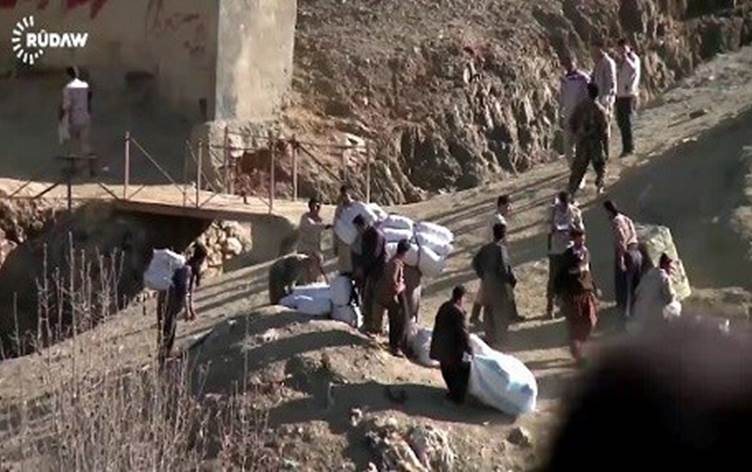ERBIL, Kurdistan Region - Clashes have continued between Iranian regime forces and Kurds in western Iran's Kurdish areas near the border with Turkey.
Three "Kurdish traders," locally known as kolbars, were shot by the Iranian regime in Urmia Province, the Kurdish Hawar News agency reported on Tuesday.
Additionally, Hawar reported traders were fired upon in Kaiman Bahurman village. One was wounded, while others were arrested and had their goods seized.
In Zanjan province a Kurdish trader from Suqis was "seriously wounded," according to Hawar, while also carrying goods.
Turkey claimed the attack was conducted by forces from the Kurdistan Workers' Party (PKK).
"PKK terrorists were behind the incident in which several other people were also injured," Turkish Foreign Minister Mevlut Cavusoglu said in a phone conversation with his Iranian counterpart Mohammad Javad Zarif on Monday, as reported by Fars and Turkey's Daily Sabah media.
Daily Sabah also blamed the Kurdistan Free Life Party (PJAK), the Iranian wing of the PKK.
"The survivors sought help from the Turkish side and the injured were airlifted to hospitals here," reported Daily Sabah. "A soldier succumbed to his wounds at the hospital. Others are recovering from their injuries."
The Turkish media agency reported the injured included "engineeers working on an irrigation project" and "soldiers were providing security."
Several armed Kurdish groups are active in the mountainous border region between Turkey, Iran, and the Kurdistan Region.
Kolbars are semi-legal porters who carry goods on their backs across the mountains and often must take dangerous routes to avoid detection by Iranian authorities.
Three "Kurdish traders," locally known as kolbars, were shot by the Iranian regime in Urmia Province, the Kurdish Hawar News agency reported on Tuesday.
Additionally, Hawar reported traders were fired upon in Kaiman Bahurman village. One was wounded, while others were arrested and had their goods seized.
In Zanjan province a Kurdish trader from Suqis was "seriously wounded," according to Hawar, while also carrying goods.
The reports of violence come after Iranian Foreign Ministry spokesman Bahram Qassemi said acccording to the country's semi-official Fars News on Monday that an Iranian border guard was killed and four others were injured in Maku, Iran, near the border with Turkey.
Turkey claimed the attack was conducted by forces from the Kurdistan Workers' Party (PKK).
"PKK terrorists were behind the incident in which several other people were also injured," Turkish Foreign Minister Mevlut Cavusoglu said in a phone conversation with his Iranian counterpart Mohammad Javad Zarif on Monday, as reported by Fars and Turkey's Daily Sabah media.
Daily Sabah also blamed the Kurdistan Free Life Party (PJAK), the Iranian wing of the PKK.
"The survivors sought help from the Turkish side and the injured were airlifted to hospitals here," reported Daily Sabah. "A soldier succumbed to his wounds at the hospital. Others are recovering from their injuries."
The Turkish media agency reported the injured included "engineeers working on an irrigation project" and "soldiers were providing security."
Several armed Kurdish groups are active in the mountainous border region between Turkey, Iran, and the Kurdistan Region.
Kolbars are semi-legal porters who carry goods on their backs across the mountains and often must take dangerous routes to avoid detection by Iranian authorities.




Comments
Rudaw moderates all comments submitted on our website. We welcome comments which are relevant to the article and encourage further discussion about the issues that matter to you. We also welcome constructive criticism about Rudaw.
To be approved for publication, however, your comments must meet our community guidelines.
We will not tolerate the following: profanity, threats, personal attacks, vulgarity, abuse (such as sexism, racism, homophobia or xenophobia), or commercial or personal promotion.
Comments that do not meet our guidelines will be rejected. Comments are not edited – they are either approved or rejected.
Post a comment